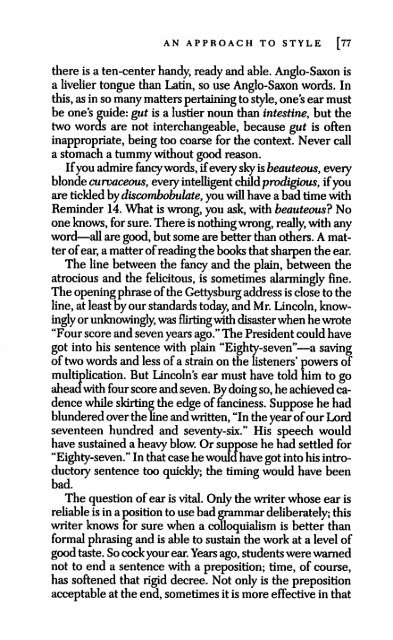You also want an ePaper? Increase the reach of your titles
YUMPU automatically turns print PDFs into web optimized ePapers that Google loves.
A N A P P R O A C H T O S T Y L E [ 7 7<br />
there is a ten-center handy, ready and able. Anglo-Saxon is<br />
a livelier tongue than Latin, so use Anglo-Saxon words. In<br />
this, as in so many matters pertaining to style, one's ear must<br />
be one's guide: gut is a lustier noun than intestine, but the<br />
two words are not interchangeable, because gut is often<br />
inappropriate, being too coarse for die context. Never call<br />
a stomach a tummy without good reason.<br />
If you admire fancy words, if every sky is beauteous, every<br />
blonde curvaceous, every intelligent child prodigious, if you<br />
are tickled by discombobulate, you will have a bad time with<br />
Reminder 14. What is wrong, you ask, with beauteous? No<br />
one knows, for sure. <strong>The</strong>re is nothing wrong, really, with any<br />
word—all are good, but some are better than others. A mat<br />
ter of ear, a matter of reading the books that sharpen the ear.<br />
<strong>The</strong> line between the fancy and the plain, between the<br />
atrocious and the felicitous, is sometimes alarmingly fine.<br />
<strong>The</strong> opening phrase of the Gettysburg address is close to the<br />
line, at least by our standards today, and Mr. Lincoln, know<br />
ingly or unknowingly, was flirting with disaster when he wrote<br />
"Four score and seven years ago." <strong>The</strong> President could have<br />
got into his sentence with plain "Eighty-seven"—a saving<br />
of two words and less of a strain on the listeners' powers of<br />
multiplication. But Lincoln's ear must have told him to go<br />
ahead with four score and seven. By doing so, he achieved ca<br />
dence while skirting the edge of fanciness. Suppose he had<br />
blundered over the line and written, "In the year of our Lord<br />
seventeen hundred and seventy-six." His speech would<br />
have sustained a heavy blow. Or suppose he had settled for<br />
"Eighty-seven." In that case he would have got into his intro<br />
ductory sentence too quickly; the timing would have been<br />
bad.<br />
<strong>The</strong> question of ear is vital. Only the writer whose ear is<br />
reliable is in a position to use bad grammar deliberately; this<br />
writer knows for sure when a colloquialism is better than<br />
formal phrasing and is able to sustain the work at a level of<br />
good taste. So cock your ear. Years ago, students were warned<br />
not to end a sentence with a preposition; time, of course,<br />
has softened that rigid decree. Not only is the preposition<br />
acceptable at the end, sometimes it is more effective in that


